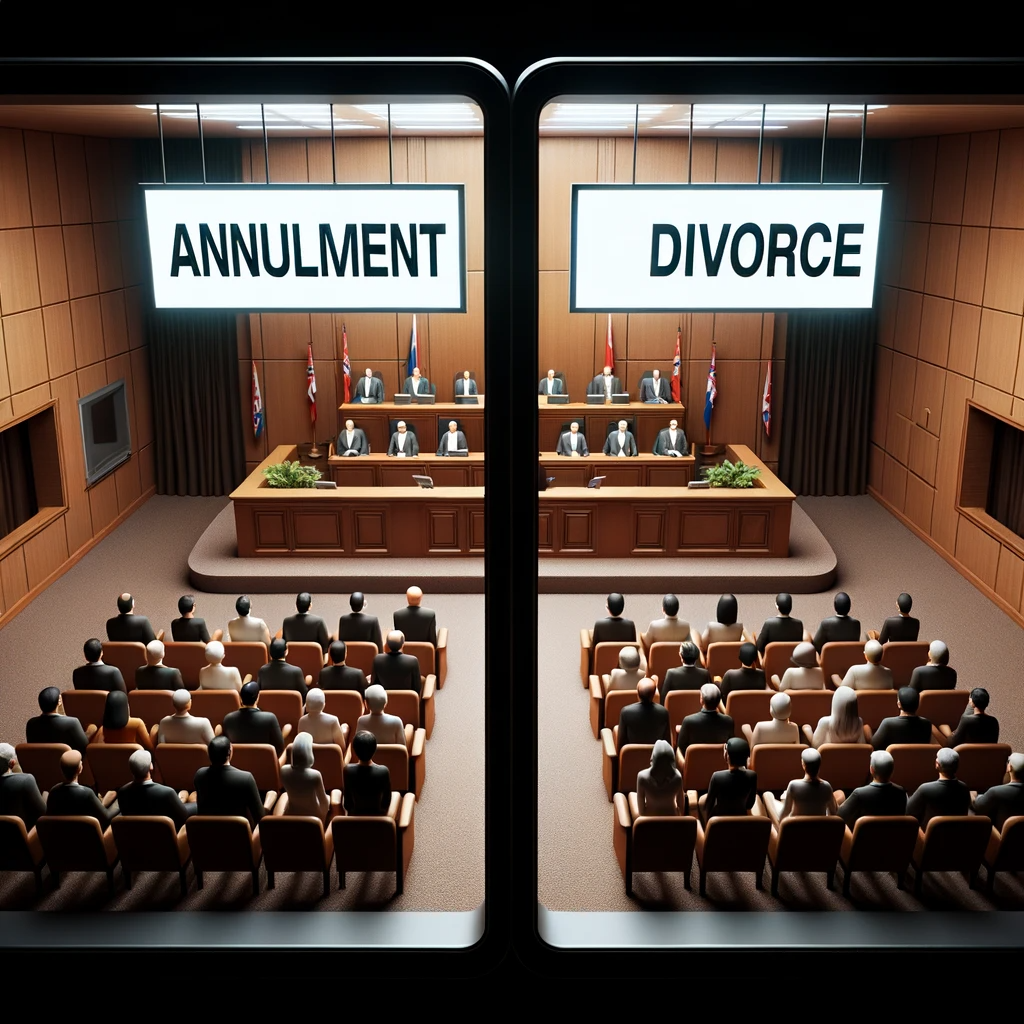If you find yourself in a marriage that is not working out, you may be considering annulment or divorce. While both options involve the dissolution of a marriage, they have significant differences in terms of legal consequences, advantages, and suitability for unique situations. As such, it is essential to understand the key distinctions between annulment and divorce before making a decision.
In this article, we will explore the intricacies of annulment versus divorce. We will delve into the legal implications of each option, their respective advantages, and how they may suit your unique situation. We will also discuss the necessary steps, timelines, and documentation required in each case, giving you a comprehensive understanding of the process.



Key Takeaways:
- Annulment and divorce differ significantly in terms of legal consequences, advantages, and suitability for unique situations.
- Annulment involves declaring a marriage void, while divorce involves the dissolution of a valid marriage.
- Annulment offers the advantage of a fresh start, while divorce provides legal finality.
- When deciding between annulment and divorce, it is essential to assess your unique situation, seek legal advice, and understand the legal process.
- Ultimately, the choice between annulment and divorce is a personal one, and seeking knowledgeable guidance is essential to make the best decision for your circumstances.
What is Annulment?


When a marriage is annulled, it is deemed to have never existed in the eyes of the law. This differs from divorce, which dissolves an existing marriage. Annulment is only granted under certain legal grounds, which vary depending on the state or country.
A void marriage is one that was never legally valid in the first place. This can occur if, for example, one of the parties was already married at the time of the ceremony if they are closely related, or if one party was forced into the marriage.
Other grounds for annulment include fraud, where one party deceived the other into marrying, and incapacity, where one of the parties was not able to understand the nature of the marriage commitment.
Applying for an annulment typically involves filing a petition and attending a hearing to prove that the marriage meets one of the legal grounds for annulment. If granted, an annulment can have significant legal consequences, including the division of property and assets, child custody, and financial support.
What is Divorce?


Divorce is the legal process of ending a marriage. It is also known as the dissolution of marriage and is the most common way for couples to end their relationship. During the process, the courts will oversee the division of assets, determine child custody arrangements, and decide on spousal support.
Unlike annulment, divorce does not involve proving that the marriage was invalid from the beginning. Instead, the grounds for divorce usually involve irreconcilable differences or the breakdown of the marriage due to misconduct.
The legal process of divorce typically involves filing a petition for dissolution of marriage, serving the other party with the appropriate documentation, and negotiating a settlement agreement. The length of time it takes to finalize a divorce varies depending on the complexity of the case and the cooperation between the parties involved.
“A divorce is like an amputation: you survive it, but there’s less of you.” – Margaret Atwood
While divorce can be emotionally draining, it can also provide a sense of legal finality and closure to the marriage. It allows individuals to move forward with their lives and start fresh. Seeking legal advice from a family lawyer can provide knowledgeable guidance and support throughout the process.
Legal Consequences of Annulment
An annulment is a legal procedure that declares a marriage null and void. As a result, an annulled marriage is considered to have never existed, unlike a divorce that terminates the marriage. An annulment can have significant legal consequences on the validity of the marriage, which affect property division, child custody, and financial support.
Effect on Marriage Validity
One of the most significant legal consequences of an annulment is its effect on the validity of the marriage. Since an annulment declares the marriage null and void, it may have retroactive effects on the couple’s legal status. This means that any benefits or obligations arising out of the marriage may be affected, especially in areas such as property and financial arrangements.
For instance, property division may become a complex issue, especially if one of the parties made considerable investments in joint property or assets. Child custody arrangements may also be affected, especially if the court declared the marriage invalid when the children were born. Lastly, financial support such as alimony may not be awarded in an annulment, as the court treats the marriage as if it never happened.
Grounds for Annulment
Annulments can be granted in cases where the marriage was never valid from the start or became invalid later on. Common grounds for an annulment may include bigamy, fraud, mental incapacitation, or underage marriage. Depending on the case, the couple may be required to provide evidence in support of the annulment claim, such as medical reports, affidavits, and other relevant documentation.
It’s important to note that the legal consequences of an annulment may vary depending on the specific circumstances of the case. Seeking legal advice from a family lawyer can help you understand the legal implications of an annulment, and whether it’s the right option for your unique situation.
Legal Consequences of Divorce
Divorce entails a range of legal consequences that can impact the future of both parties. A key aspect of the divorce process is the division of marital assets. This involves dividing assets and property acquired during the marriage, which can include real estate, investments, and retirement accounts.
In addition to dividing assets, child custody arrangements must be made. The court will determine the best interests of the child and may award joint or sole custody to one or both parents.
Another aspect of divorce is spousal support, which involves one party providing financial assistance to the other after separation. The amount and duration of spousal support are determined by the court and can vary widely depending on factors such as the length of the marriage, the earning potential of each party, and the standard of living during the marriage.
The legal consequences of divorce can be complex and emotionally charged. It is essential to have a clear understanding of the divorce settlement and the associated legal implications to ensure a fair outcome for both parties.
Advantages of Annulment
While annulment and divorce both offer legal remedies for ending a marriage, annulment offers some unique advantages. For individuals who are seeking a fresh start, an annulment can provide a sense of closure and a clean slate.
With an annulment, the marriage is declared null and void, meaning that legally it never existed. This can be especially beneficial for those who wish to erase the marriage from their record or are concerned about the stigma associated with divorce.
Furthermore, an annulment can allow individuals to move on emotionally from the marriage, as it provides a level of finality that divorce may not. While divorce can be a lengthy and emotionally draining process, annulment can provide a quicker and less contentious resolution.
Additionally, an annulment may have financial advantages over divorce. For example, in some states, property division laws may be more favorable to those seeking an annulment. Child support and alimony may also be affected by the declaration of a void marriage.
In summary, if you are seeking a fresh start and a clean break from your marriage, annulment may be a viable option for you. Consider seeking legal advice to determine if annulment is the best course of action for your unique situation.
Advantages of Divorce
While annulment may suit some individuals, divorce has its own set of advantages. One of the most significant advantages is legal finality. Once a divorce is finalized, both parties are free to move on with their lives without any further legal obligations to one another.
Divorce also allows for a more straightforward division of marital assets. Unlike annulment, where the validity of the marriage is called into question, divorce follows a set legal process for dividing property, assets, and debts.
Additionally, divorce allows for established child custody arrangements and child support obligations. This provides clarity and stability for the children of the marriage, as well as peace of mind for the parents.
Overall, the legal finality and clear processes involved in divorce can bring closure to the end of a marriage, allowing individuals to focus on the future.
Assessing Your Unique Situation
If you find yourself choosing between annulment or divorce, it’s important to assess your unique situation carefully. Factors to consider include the length of the marriage, the presence of children, financial considerations, and personal preferences.
One key consideration is the validity of the marriage in question. An annulment is typically only an option if the marriage is void or voidable due to specific legal grounds such as fraud, coercion, or lack of capacity.
Another consideration is the legal consequences of each option. An annulment may be advantageous for those seeking a clean slate and a fresh start, while divorce offers more finality and closure in legal and emotional terms.
It’s important to also weigh the practical considerations, such as the division of property, child custody arrangements, and financial support. In some cases, annulment may result in a different allocation of assets and obligations compared to divorce.
Considerations for Annulment
When considering annulment, it’s important to remember that it is only an option in certain circumstances. The legal grounds for annulment can vary by state, so it’s important to consult with a knowledgeable family lawyer to determine if you are eligible.
An annulment may be preferable in cases where the marriage is relatively short, there are no children involved, and the couple has few joint assets or financial obligations. Additionally, annulment may be appealing for personal or religious reasons, as it may be viewed as a way to invalidate a union that was never truly legitimate.
Considerations for Divorce
Divorce may be a more suitable option for those seeking a legally binding dissolution of marriage. While it may not provide the same clean slate as annulment, it offers more finality and closure for those looking to move on and start anew.
Divorce may be a more practical option for couples with children, joint assets, and significant financial obligations. It may also be the only option when the legal grounds for annulment are not present.
Ultimately, the choice between annulment and divorce is a personal one and depends on your unique circumstances. Seeking legal advice and guidance from a knowledgeable family lawyer can help you make the best decision for you and your family.
Seeking Legal Advice
When considering annulment or divorce, it is crucial to seek the guidance of a family lawyer. Legal advice offers knowledgeable guidance throughout the process, ensuring that you make informed decisions in your unique situation.


A family lawyer can assess your case, explain the legal consequences of each option, and help you understand your rights and obligations. They can also provide practical advice on child custody, property division, and financial support.
Furthermore, a family lawyer can help you navigate the legal process, ensuring that you complete all necessary steps and documentation correctly and on time. They can also represent you in court, if necessary.
Overall, seeking legal advice from a family lawyer is an essential step in deciding between annulment and divorce. It provides you with the necessary knowledge and support to make the best decision for your unique circumstances.
Understanding the Process
Before deciding between annulment and divorce, it’s essential to understand the legal steps involved in each process.


Annulment: The process of obtaining an annulment typically involves filing a petition with the court and providing evidence that the marriage is void or invalid. This evidence may include proving that one or both parties were not of legal age at the time of the marriage, that one party was already legally married, or that the marriage was entered into under duress or fraud. If the court grants the annulment, the marriage is considered to have never existed legally.
Divorce: The process of obtaining a divorce involves filing a petition with the court and reaching a divorce settlement with your spouse, either through negotiation or litigation. The settlement typically covers issues such as division of property and assets, child custody, and financial support. If a settlement cannot be reached, a judge will make a final ruling. Once the divorce is finalized, the marriage is legally dissolved.
It’s important to note that the legal steps involved in both annulment and divorce may vary depending on the specific circumstances of the case and the state or country in which you reside.
Legal Assistance
Whether you choose annulment or divorce, seeking legal assistance can make the process smoother and less stressful. A family lawyer can provide knowledgeable guidance, helping you navigate the legal steps involved in each option. With their assistance, you can ensure all necessary documentation is completed, deadlines are met, and your legal rights are protected.
Overall, understanding the legal process involved in annulment and divorce can help you make an informed decision about which option is right for you. By seeking legal assistance, you can confidently navigate the process and move forward with confidence.
Weighing Your Options
Choosing between annulment and divorce can be a difficult decision. It involves weighing the pros and cons of each option and determining which one is best for your unique situation. Here, we will summarize the key considerations for weighing your options.
The Pros and Cons of Annulment
One of the main advantages of annulment is that it treats the marriage as if it never happened, allowing individuals to start fresh both legally and emotionally. Additionally, annulment may be the best option for those in unique situations, such as marriages that were void from the start or those where one party was coerced into marriage.
However, annulment may not be available to everyone, as it requires specific legal grounds to be met. It may also have different legal consequences than divorce, particularly in terms of property division and financial support.
The Pros and Cons of Divorce
Divorce provides legal finality and closure to a marriage, allowing individuals to move on with their lives. It also offers more flexibility in terms of legal grounds, making it available to a wider range of couples.
However, divorce can be a complicated and lengthy legal process, particularly if parties do not agree on the terms of the divorce settlement. It may also have significant legal and financial consequences, such as the division of marital assets and financial support arrangements.
Weighing Your Unique Situation
When deciding between annulment and divorce, it is important to assess your unique situation. Consider factors such as the length of the marriage, the presence of children, financial considerations, and personal preferences.
Remember, seeking legal advice can help you make an informed decision based on your individual circumstances. A family lawyer can provide knowledgeable guidance throughout the legal process, ensuring your best interests are protected.
Ultimately, the choice between annulment and divorce is a personal one. By carefully weighing your options and seeking legal advice, you can make the best decision for your unique situation.
Conclusion
To conclude, choosing between annulment and divorce is a personal decision that should be made after considering all the factors specific to your situation. It’s essential to seek legal advice from a competent family lawyer to guide you through the process and help you make informed decisions.
Throughout this article, we have explored the differences between annulment and divorce, including the legal consequences, advantages, and considerations that should factor into your decision. Ultimately, both options offer unique benefits, and the right choice for you will depend on your personal circumstances.
It’s important to remember that while the legal process can be daunting, it’s also an opportunity to start fresh and move on with your life. By understanding the legal steps involved in annulment and divorce and weighing your options carefully, you can make the best decision for your situation and the future.
Whether you choose annulment or divorce, it’s crucial to keep in mind that both options offer a path forward from a difficult situation, and you don’t have to go through it alone. Seeking knowledgeable guidance and support from a qualified family lawyer can make all the difference in achieving the best possible outcome for your circumstances.



FAQ
What is the difference between annulment and divorce?
Annulment and divorce are both legal processes used to end a marriage, but they have significant differences. An annulment declares a marriage null and void, as if it never existed, while a divorce dissolves a valid marriage.
How does annulment differ from divorce?
Annulment differs from divorce in that it deems a marriage invalid from the start, while divorce ends a valid marriage. Annulment erases the marriage as if it never happened, whereas divorce acknowledges that a legal marriage existed.
What are the legal grounds for obtaining an annulment?
The legal grounds for obtaining an annulment vary depending on jurisdiction, but common grounds include fraud, bigamy, impotence, lack of consent, or underage marriage.
What is involved in obtaining a divorce?
Obtaining a divorce involves filing a legal petition, providing evidence of irreconcilable differences, and going through a legal process to dissolve the marriage. It typically includes division of assets, custody arrangements, and determining spousal support.
What are the legal consequences of annulment?
The legal consequences of annulment can vary, but generally, it treats the marriage as if it never existed. This can affect property division, child custody, and financial support arrangements. It may also have implications for future relationships.
What are the legal consequences of divorce?
The legal consequences of divorce include the division of marital assets, determination of child custody arrangements, and potentially spousal support. It legally terminates the marriage and allows both parties to move on with their lives.
What are the advantages of annulment?
Choosing annulment offers individuals the opportunity to start fresh legally and emotionally. It can provide closure to a marriage that was invalid from the start and may have benefits in future relationships.
What are the advantages of divorce?
Divorce provides legal finality and closure to a valid marriage. It allows individuals to move forward with their lives and make new arrangements regarding property division, child custody, and support.
How do I assess my unique situation when deciding between annulment and divorce?
When deciding between annulment and divorce, consider factors such as the length of the marriage, presence of children, financial considerations, and personal preferences. Assessing your unique situation will help you make the best choice for your circumstances.
Why is seeking legal advice important when navigating annulment and divorce?
Seeking legal advice from a family lawyer is crucial when dealing with annulment and divorce. A knowledgeable lawyer can provide guidance and ensure you make informed decisions throughout the process, protecting your rights and interests.
What is the legal process involved in annulment and divorce?
The legal process for annulment and divorce can vary, but typically involves filing a petition, providing evidence or grounds, going through court proceedings, and reaching agreements on property division, child custody, and support.
How can I weigh my options between annulment and divorce?
Weighing your options between annulment and divorce involves considering the legal consequences, advantages, and considerations discussed earlier. Assessing your individual circumstances and seeking legal advice can help you make an informed decision.





Leave a Reply